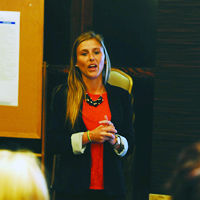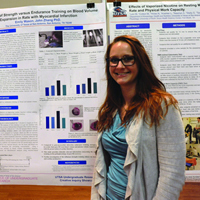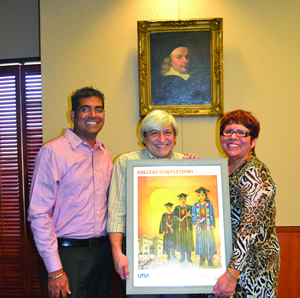

Hundreds of undergraduate students from The University of Texas at San Antonio (UTSA) presented their work during the spring semester at the inaugural Undergraduate Research and Creative Inquiry Showcase. More than 20 participants were students in the College of Education and Human Development (COEHD).
Among those who presented their research was Emily Wason, a graduate student in the Department of Kinesiology, Health, and Nutrition. Her research, which began during her time as an undergraduate kinesiology student under Dr. John Zhang, looked at the “Effect of Strength versus Endurance Training on Blood Volume Expansion in Rats with Myocardial Infarction.”
Myocardial Infarction.” “We conducted cardiovascular research after a heart attack and assessed the rats’ hormonal response and heart tissue,” said Wason. “We’re investigating whether or not lifting weights is more beneficial in preventing some of the dilation of the heart then endurance training, or even a combination of both.”
Wason’s research took place over the course of a year. She hopes to continue looking at strength training versus endurance training after a heart attack with a few modifications.

“We’re going to increase our sample size so that we have better statistics,” said Wason. “It all looks really promising.”
Elvia Rivera, a senior interdisciplinary studies major with an early childhood through sixth grade bilingual certification, used her research to find more about her personal history and understand where her family came from.
“I knew from the beginning that I wanted this inquiry to be about me, more so about my family’s origins,” said Rivera. “I decided to complete my interdisciplinary inquiry going back to my grandparents’ indigenous culture. And I was able to connect my research with my future profession as a teacher. I want my students to be able to ask those ‘why?’ questions. That’s what lead a lot of my research.”
Other research projects presented included “Evaluation of Scapular Kinematics and Muscle Activity During Milking Tasks,” “Jackson Keller Elementary KIN Program,” “Music in My Life,” and “The Perfect Sole Mate.”
The showcase, which was sponsored by the Office of Undergraduate Research, was the first of it’s kind at UTSA.

The UTSA Department of Kinesiology, Health and Nutrition in the College of Education and Human Development has announced a partnership with Methodist Healthcare System of San Antonio that will give UTSA students handson training in cardiology patient care while providing research opportunities designed to improve clinical services and outcomes.
UTSA researchers Donovan Fogt and William Cooke, along with Curtis Hart are merging their individual expertise and laboratory capacities to create the UTSA Integrative Cardiopulmonary & Autonomic Performance Laboratories (ICAPL). Using advanced techniques and equipment, ICAPL researchers will gather information to uncover better treatment options for the patients while providing immediate feedback to referring physicians. UTSA students and researchers working in ICAPL will help identify early factors contributing to the development and progression of cardiac diseases.
Local cardiologists have suggested that up to 25 percent of their symptomatic patients test negative for cardiovascular disease, leaving few options for continued care. One of the key goals of this partnership is to provide specialized testing of such patients in the ICAPL. The testing results will guide preventative and treatment options to patients and clinicians, including referrals to clinical specialists, physical activity and performance, nutrition and health behaviors.
Additionally, the partnership will prepare students for careers in health professions within the Methodist Healthcare System and beyond. By involving kinesiology, health and nutrition students in this initiative, the department hopes to advance its UTSA students ahead of their peers in the job market.
“We have an obligation to help our students receive specialized training and be competitive for professional schools and medical careers. Students participating in the UTSA - Methodist Healthcare System of San Antonio partnership will benefit from our top-tier program,” said Fogt, associate professor in the Department of Health, Kinesiology, Health and Nutrition and co-director of the UTSA ICAPL.

The UTSA Center for Research and Policy in Education released a report focused on Latino student success that finds ways to help this typically underserved population. The report, “Ventajas/Assets y Conocimientos/Knowledge, Leveraging Latin@ Strengths to Foster Student Success,” looks at the advantages and disadvantages Latino students face when entering college and focuses on leveraging strengths.
Led by UTSA professors Laura Rendón and Amaury Nora and Vijay Kanagala of the University of Vermont, the study found that students who come from Latino backgrounds could use their cultural wealth and experiences to transcend socioeconomic circumstances that might otherwise hold them back.
Because these assets are not always gained through formal education, educators might not look at these strengths as a means to overcome obstacles.
“Students can develop strengths through lived experiences, cultural traditions and life challenges, which help them become survivors and move past hurdles,” said Rendón, the study’s lead researcher.
The research also found that Latino students often struggle through college because of the multiple worlds they juggle including academia, familial responsibilities and their former communities. But, their sense of responsibility to give back to their communities could potentially help them push themselves further in their education.
Likewise, other challenges they face could work as assets. For example, students can learn to use their bilingualism to their advantage, and if they are able to manage both worlds, they could develop critical high-level cognitive skills.
“Relying on this framework rather than one which looks at Latino students as deficient can help college faculty and support staff to serve Latino students during their higher education careers,” said Nora, the study’s co-researcher.